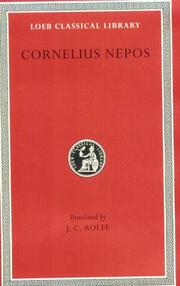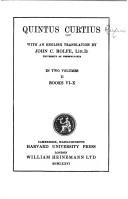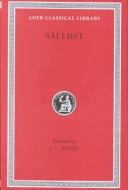| Listing 1 - 10 of 19 | << page >> |
Sort by
|
Book
Year: 1963 Publisher: New York (N.Y.) Cooper Square
Abstract | Keywords | Export | Availability | Bookmark
 Loading...
Loading...Choose an application
- Reference Manager
- EndNote
- RefWorks (Direct export to RefWorks)

ISBN: 0674995147 9780674995147 Year: 2005 Volume: 467 Publisher: Cambridge, Mass. Harvard university press
Abstract | Keywords | Export | Availability | Bookmark
 Loading...
Loading...Choose an application
- Reference Manager
- EndNote
- RefWorks (Direct export to RefWorks)
Cornelius Nepos (c. 99-c. 24 BCE)is the earliest biographer in Latin whose work we have. Extant are parts of his De Viris Illustribus, including biographies of mostly Greek military commanders and of two Latin historians, Cato and Atticus.
Languages & Literatures --- Greek & Latin Languages & Literatures --- Classical biography --- Generals --- Historians --- Statesmen --- Greece --- Rome (Empire) --- Historiographers --- Rim --- Roman Empire --- Roman Republic --- Rome --- Romi --- Ancient Greece --- Ellada --- Ellas --- Ellēnikē Dēmokratia --- Elliniki Dimokratia --- Grčija --- Grèce --- Grecia --- Griechenland --- Hellas --- Hellenic Republic --- Hellēnikē Dēmokratia --- Kingdom of Greece --- République hellénique --- Royaume de Grèce --- Vasileion tēs Hellados --- Yaṿan --- Public officers --- Scholars --- Armed Forces --- Biography --- Officers --- Byzantine Empire --- Italy --- Romi (Empire) --- Hellada --- al-Yūnān --- Gret͡sii͡ --- Xila --- Yūnān
Book
Abstract | Keywords | Export | Availability | Bookmark
 Loading...
Loading...Choose an application
- Reference Manager
- EndNote
- RefWorks (Direct export to RefWorks)
Book
Abstract | Keywords | Export | Availability | Bookmark
 Loading...
Loading...Choose an application
- Reference Manager
- EndNote
- RefWorks (Direct export to RefWorks)
Book
Abstract | Keywords | Export | Availability | Bookmark
 Loading...
Loading...Choose an application
- Reference Manager
- EndNote
- RefWorks (Direct export to RefWorks)
Book
Abstract | Keywords | Export | Availability | Bookmark
 Loading...
Loading...Choose an application
- Reference Manager
- EndNote
- RefWorks (Direct export to RefWorks)

ISBN: 0674994078 9780674994072 0674994051 9780674994058 9780674994072 Year: 1998 Publisher: Cambridge (Mass.) Harvard university press
Abstract | Keywords | Export | Availability | Bookmark
 Loading...
Loading...Choose an application
- Reference Manager
- EndNote
- RefWorks (Direct export to RefWorks)
Annotation Quintus Curtius was apparently a rhetorician who lived in the first century of the Roman empire and, early in the reign of Claudius (41Â-54 CE), wrote a history of Alexander the Great in 10 books in clear and picturesque style for Latin readers. The first two books have not survivedÂ--our narrative begins with events in 333 BCEÂ--and there is material missing from books V, VI, and X. One of his main sources is Cleitarchus who, about 300 BCE, had made Alexander's career a matter of marvellous adventure. Curtius is not a critical historian; and in his desire to entertain and to stress the personality of Alexander, he elaborates effective scenes, omits much that is important for history, and does not worry about chronology. But he does not invent things, except speeches and letters inserted into the narrative by traditional habit. 'I copy more than I believe', he says. Three features of his story are narrative of exciting experiences, development of a hero's character, and a disposition to moralise. His history is one of the five extant works on which we rely for the career of Alexander the Great. The Loeb Classical Library edition of Quintus Curtius is in two volumes.

ISBN: 0434991163 0674991281 9780434991167 9780674991286 Year: 2000 Volume: 116 Publisher: Cambridge Harvard university press
Abstract | Keywords | Export | Availability | Bookmark
 Loading...
Loading...Choose an application
- Reference Manager
- EndNote
- RefWorks (Direct export to RefWorks)
Gymnasium. --- Lateinunterricht. --- Lehrmittel. --- Sallustius Crispus, Gaius, --- Österreich.
Book
Abstract | Keywords | Export | Availability | Bookmark
 Loading...
Loading...Choose an application
- Reference Manager
- EndNote
- RefWorks (Direct export to RefWorks)
Book
Abstract | Keywords | Export | Availability | Bookmark
 Loading...
Loading...Choose an application
- Reference Manager
- EndNote
- RefWorks (Direct export to RefWorks)
| Listing 1 - 10 of 19 | << page >> |
Sort by
|

 Search
Search Feedback
Feedback About UniCat
About UniCat  Help
Help News
News